THE GOD COMMITTEE is an important and heart-wrenching movie that examines the moral, ethical, and financial dilemmas and considerations of organ transplantation through a compelling narrative story and outstanding performances, most notably an award-worthy turn by Kelsey Grammer. Non-judgmental, writer/director Austin Stark’s THE GOD COMMITTEE opens the door for thought-provoking discussion while shining a light on the global need for organ donors.
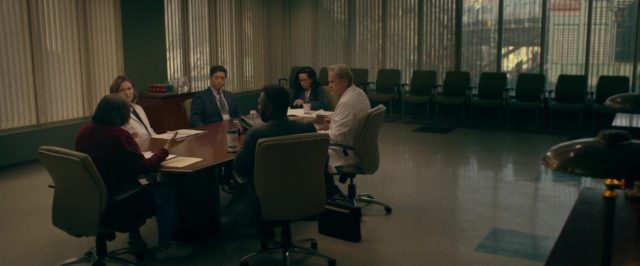
Adapted by Stark from Mark St. Germain’s stage play, THE GOD COMMITTEE is the story of a donor heart that suddenly becomes available at a New York Hospital. An organ transplant committee has one hour before the organ becomes non-viable within which to decide which of three patients in their hospital on the United Network for Organ Sharing (UNOS) list deserves the heart.
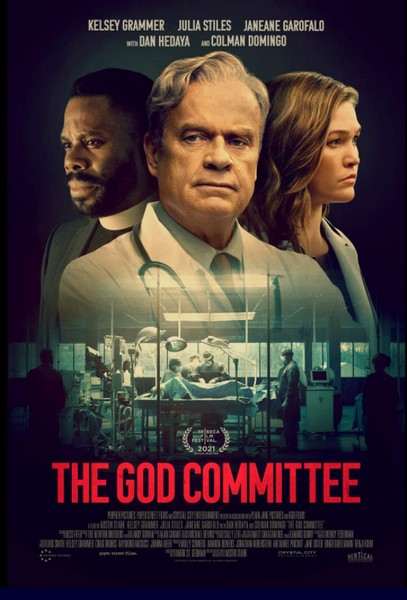
As we meet the committee, which includes the clinical and unemotional renowned heart surgeon Andre Boxer; Jordan Taylor, a younger but equally talented cardiac surgeon; the somewhat indecisive and tentative Dr. Lau; doctor turned hospital bureaucrat and head of the transplant program at the hospital, Valerie Gilroy; cardiac charge nurse Wilkes; with some added influence by Father Dunbar who appears to “speak” for the hospital board, we see first-hand what it’s like to “play God.” Does the heart go to the name at the top of the list or are there other factors to consider when deciding who will be given a second chance at life? What are the medical considerations? Is 50 pounds overweight reason enough to deny life to a man with a family and a strong desire and will to live? Is disinterest and ambivalence by a patient in whether she lives or dies grounds to deny her a second chance? And what about the hospital that needs a better success rate for its transplant program and is not above accepting bribes in order to ignore the list and give the heart to a young recovering addict with a powerful and wealthy family? Adding to the process is Boxer’s endgame; a move into the private research sector which will require funding. And where does the Black Market enter into the conversation?
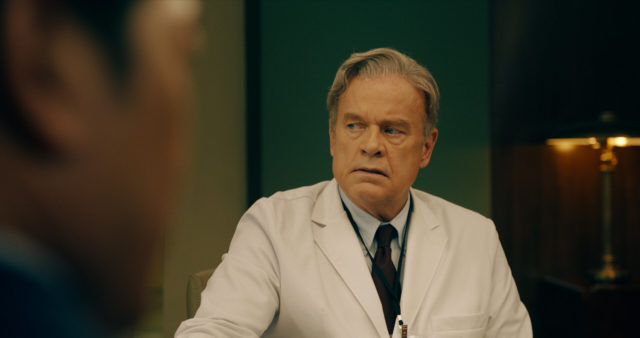
Performances are first-rate, starting with Grammer who knocks it out of the part of Dr. Andre Boxer. A performance the level of which we have never seen before from Grammer sets not only the tone of the film, but defines the gravitas of what’s at stake for the patients, the hospital, and for himself. The introspective intensity Grammer infuses into Boxer feels at times like a ticking time bomb, ready to explode at any minute. We feel the urgency of Boxer’s work as a cardiac surgeon and researcher and the unspoken idea that with every minute, another life that might be saved is lost. But where Grammer excels is in conveying the clinical concern of Boxer versus the human or emotional concern. He walks a tightrope of emotional and analytical complexity.
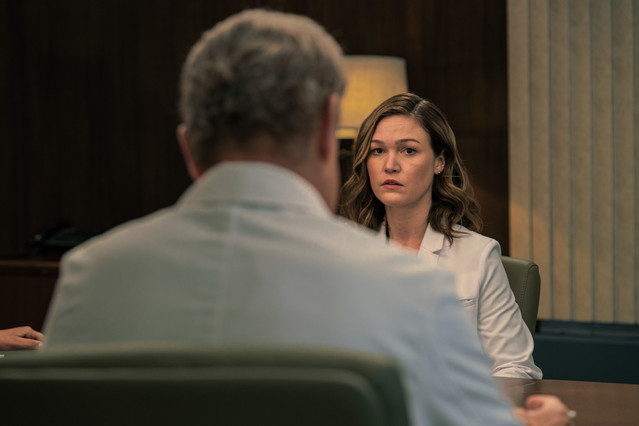
Going toe-to-toe opposite Grammer is Julia Stiles who, as Dr. Jordan Taylor, maintains a stoicism and emotional distance with a youthful objectivity while still seeing the humanity, the soul, if you will, of each patient and potential transplant candidate. Adding to the character is the failed personal relationship between Boxer and Taylor, something that Grammer and Stiles both compartmentalize and keep out of the committee meetings during debate. It’s an interesting dance between these two.
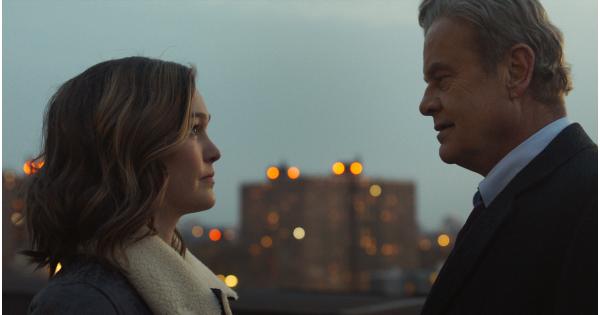
As program head and one-time treating doctor Dr. Valerie Gilroy, Janeane Garofalo perfectly captures the cold-hearted, bottom line number-crunching mentality we so often see and hear about with hospital (and insurance) bureaucracy while also adding a self-serving egotism and fear to the role. It’s interesting to watch Garofalo as Gilroy tries to hide her real motivations and then be caught with her hand in the cookie jar, so to speak.
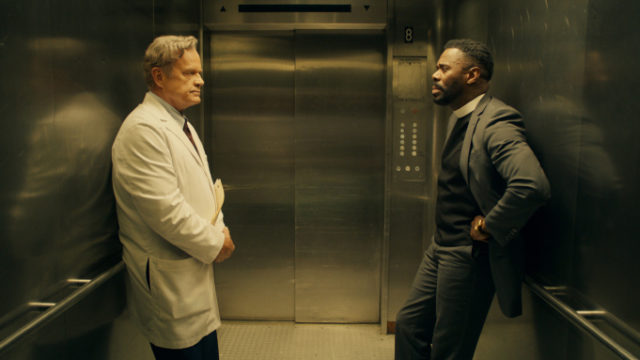
Dan Hedaya is rock solid as a wealthy and influential man who will stop at nothing to see that his drug addict son gets a heart. You feel a father’s clawing angst trying to buy his son’s second chance at life. Another interesting character and performance comes courtesy of Colman Domingo as Father Dunbar. Domingo plays the hell out of this role creating ambiguities one normally wouldn’t expect from a man of the cloth in a God-like situation.
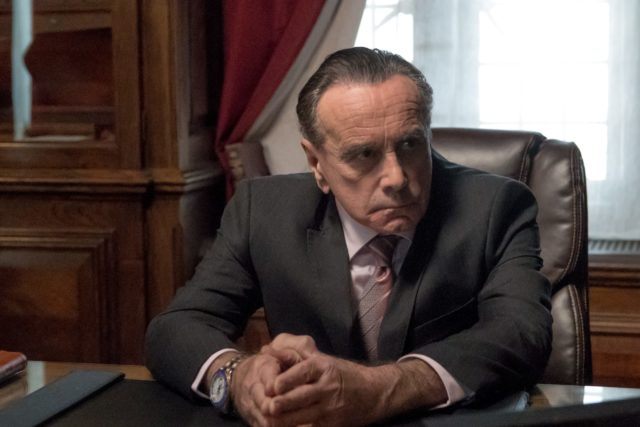
Expanding on St. Germain’s play, Stark runs a dual timeline – 2014 and 2021 – seamlessly jockeying between the past and present as the clock ticks down on decision-making in 2014, as well as in 2021, using cinematography, and particularly lighting and color, to not only build tension but to distinguish the time periods and where our doctors are in their own careers and personal lives. We see decisions made in 2014 and the result seven years later. And even if you are familiar with the original play, not only do we see this future timeline, but a lot of twists and turns that give pause for thought and debate.
Calling on the talents of cinematographer Matt Sakatani Roe, framing is deliberate and paced in the use of slow zooms over time while expanding wider in the 2021 timeline. ECUs judiciously come into play, most notably with Grammer’s Boxer in 2021 and with seeing the heart itself.
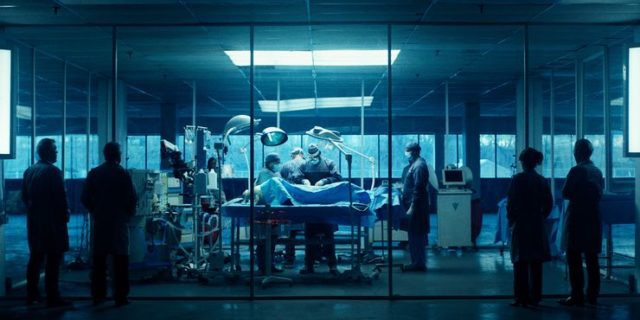
So often with a “non-linear” approach in storytelling or, as here, with a parallel timeline set seven years apart, there is confusion as to the when and where with each scene shift. Thanks to Stark and his editor Alan Canant, that’s not the case here. Focusing on the visual distinctions, the back and forth is seamless and complementary between the years. Stunning are the “holds” on certain shots that may feel both uncomfortable and thrilling at the same time.
Scoring by The Newton Brothers is subtle, still, and restrained while marrying high tension dramatic moments thanks to a more organic instrumentation and modern, yet classical, feel. A beautiful undercurrent that flows between the decades.
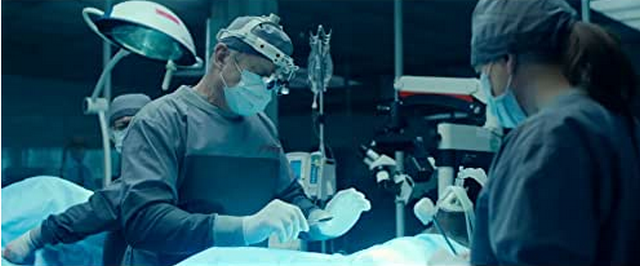
Not just a well-crafted and well-told film from a filmmaking standpoint about an important issue, at the end of the day, THE GOD COMMITTEE puts the issues surrounding organ transplants front and center and lays bare the considerations for patients, families, friends, doctors, hospitals, and researchers. There is no easy answer. But perhaps sometime in the not too distant future, the day will come when the choice of who lives or dies because of a shortage of organs for transplant will no longer be a concern; that organ donors will increase and researchers will make leaps and bounds with artificial hearts and other organs, as well as interspecies transplants. It’s not easy playing God.
Written and Directed by Austin Stark. Based on the play by Mark St. Germain.
Cast: Kelsey Grammer, Julia Stiles, Janeane Garofalo, Dan Hedaya, Colman Domingo, Peter Kim, Patricia R. Floyd
by debbie elias, 07/01/2021












